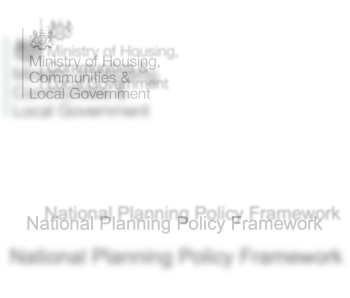Carbon assessments of buildings and targets could come within years
Contents |
[edit] Planning consultation launch for 2023
In a statement of intent to tackle emissions from the UK’s built environment, the Government appears willing to explore whole-life carbon assessments and ratcheting targets to reduce emissions. In 2023 Ministers will launch a consultation on implementing a proposal from the Environmental Audit Committee (EAC) which has the potential to address the source of 25% of the UK’s greenhouse gas emissions.
[edit] Response to Environmental Audit Committee report
The Government made the undertaking in its response to an EAC report which examined the sustainability of the built environment.
EAC considers that the new administration must now build on this momentum, acknowledging the urgency of clamping down on built environment emissions which was demonstrated in the Committee’s report. EAC considers that the Government’s timescales need to be more ambitious to meet carbon budgets and the Government’s net zero target. The Committee will press for the consultation to cover the mandating of whole-life carbon assessments through regulation and the planning system, and to propose progressively more ambitious carbon targets for the built environment that are consistent with climate commitments and carbon budgets. Crucially, the consultation must propose a clear and achievable timeline for introduction of mandatory whole-life carbon assessments.
EAC welcomes the Government’s intention to review the National Planning Policy Framework to ensure that it contributes as fully as possible to climate change mitigation and adaptation efforts. This review is also to consider the role of circular economy principles in the built environment to boost the recycling and reuse of materials, a significant Committee recommendation.
While the Government’s response engages thoughtfully with a number of EAC’s recommendations, members are concerned that the rejection of a recommendation to fast-track the introduction of the Future Homes Standard represents a missed opportunity. If brought forward, the Future Homes Standard would accelerate the construction of low carbon homes with increased energy efficiency, which would in turn lead to lower household bills for energy use.
[edit] Chair's comment
Environmental Audit Committee Chairman, Rt Hon Philip Dunne MP, said:
“The Government’s positive response to our Committee’s report represents a clear statement of intent to crack down on emissions from the built environment. Emissions from buildings – both in the fabric of building materials and the operating emissions – have been overlooked for too long, but it is a promising sign that Ministers now appear intent on taking action.
“Emissions in buildings span the responsibilities of multiple government departments. After years of pressure from this Committee, it appears that in this area departments are finally starting to demonstrate the joined-up working which is vital to get to net zero.
“But this progress must continue under the new administration. It is very welcome that the Prime Minister has already confirmed her Government is committed to net zero. Tackling emissions from our building stock must be a vital part in achieving this.
“I hope the new administration will reconsider fast-tracking the Future Homes Standard. Mandating energy efficient new-build homes will not only help the UK’s net zero ambitions, but will reduce the energy bills for their future occupants. The Government must be bold and act now on energy efficiency.”
EAC has written to the Secretary of State for Levelling Up, Housing and Communities reiterating the Committee’s findings detailed in its report, and making the case for action to address emissions associated with the built environment.
This article is quoted from the UK governments commitee report dated September 30 2002, follow this link to read the commitee report in full with links to the full report and related publications
[edit] Related articles on Designing Buildings
- Aligning net zero with the levelling-up agenda.
- Government net zero review 2022.
- Net zero strategy: build back greener
- Sustainability in building design and construction.
- The sustainability of construction works.
[edit] Further links
Inquiry: Sustainability of the built environment
Featured articles and news
The 2025 draft NPPF in brief with indicative responses
Local verses National and suitable verses sustainable: Consultation open for just over one week.
Increased vigilance on VAT Domestic Reverse Charge
HMRC bearing down with increasing force on construction consultant says.
Call for greater recognition of professional standards
Chartered bodies representing more than 1.5 million individuals have written to the UK Government.
Cutting carbon, cost and risk in estate management
Lessons from Cardiff Met’s “Halve the Half” initiative.
Inspiring the next generation to fulfil an electrified future
Technical Manager at ECA on the importance of engagement between industry and education.
Repairing historic stone and slate roofs
The need for a code of practice and technical advice note.
Environmental compliance; a checklist for 2026
Legislative changes, policy shifts, phased rollouts, and compliance updates to be aware of.
UKCW London to tackle sector’s most pressing issues
AI and skills development, ecology and the environment, policy and planning and more.
Managing building safety risks
Across an existing residential portfolio; a client's perspective.
ECA support for Gate Safe’s Safe School Gates Campaign.
Core construction skills explained
Preparing for a career in construction.
Retrofitting for resilience with the Leicester Resilience Hub
Community-serving facilities, enhanced as support and essential services for climate-related disruptions.
Some of the articles relating to water, here to browse. Any missing?
Recognisable Gothic characters, designed to dramatically spout water away from buildings.
A case study and a warning to would-be developers
Creating four dwellings... after half a century of doing this job, why, oh why, is it so difficult?
Reform of the fire engineering profession
Fire Engineers Advisory Panel: Authoritative Statement, reactions and next steps.
Restoration and renewal of the Palace of Westminster
A complex project of cultural significance from full decant to EMI, opportunities and a potential a way forward.
Apprenticeships and the responsibility we share
Perspectives from the CIOB President as National Apprentice Week comes to a close.























